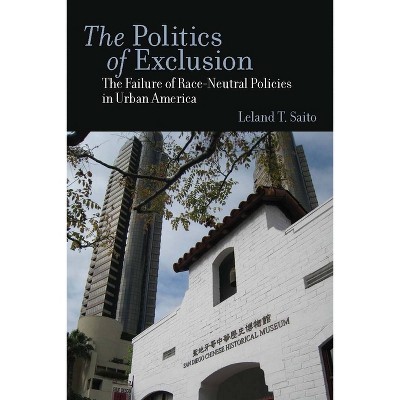About this item
Highlights
- From the 1970s on, Los Angeles was transformed into a center for entertainment, consumption, and commerce for the affluent.
- About the Author: Leland T. Saito is Professor of Sociology and American Studies & Ethnicity at University of Southern California.
- 266 Pages
- Social Science, Discrimination & Race Relations
Description
About the Book
"From the 1970s on, Los Angeles was transformed into a center for entertainment, consumption, and commerce for the affluent. Mirroring the urban development trend across the nation, new construction led to the displacement of low-income and working-class racial minorities, as city officials targeted these neighborhoods for demolition in order to spur economic growth and bring in affluent residents. Responding to the displacement, there emerged a coalition of unions, community organizers, and faith-based groups advocating for policy change. In Building Downtown Los Angeles Leland Saito traces these two parallel trends through specific construction projects and the backlash they provoked. He uses these events to theorize the past and present processes of racial formation and the racialization of place, drawing new insights on the relationships between race, place, and policy. Saito brings to bear the importance of historical events on contemporary processes of gentrification and integrates the fluidity of racial categories into his analysis. He explores these forces in action, as buyers and entrepreneurs meet in the real estate marketplace, carrying with them a fraught history of exclusion and vast disparities in wealth among racial groups"--Book Synopsis
From the 1970s on, Los Angeles was transformed into a center for entertainment, consumption, and commerce for the affluent. Mirroring the urban development trend across the nation, new construction led to the displacement of low-income and working-class racial minorities, as city officials targeted these neighborhoods for demolition in order to spur economic growth and bring in affluent residents. Responding to the displacement, there emerged a coalition of unions, community organizers, and faith-based groups advocating for policy change. In Building Downtown Los Angeles Leland Saito traces these two parallel trends through specific construction projects and the backlash they provoked. He uses these events to theorize the past and present processes of racial formation and the racialization of place, drawing new insights on the relationships between race, place, and policy. Saito brings to bear the importance of historical events on contemporary processes of gentrification and integrates the fluidity of racial categories into his analysis. He explores these forces in action, as buyers and entrepreneurs meet in the real estate marketplace, carrying with them a fraught history of exclusion and vast disparities in wealth among racial groups.
Review Quotes
"Saito masterfully condenses decades of scholarship about Los Angeles, the city as an urban site, and theoretical work about race and space. In retracing the networks among growth interests and community organizations, Saito unveils a complicated web of influences and power brokers.... As we continue to grasp creating a more equitable future, Saito's book highlights the ongoing process of how Angelenos have worked to assert their power and create a more redistributive urban space in Los Angeles' downtown."--Emiliano Aguilar, Journal of American Ethnic History
"Building Downtown Los Angeles has much to recommend it. It provides a well-researched account of the development of several key projects in Los Angeles's downtown beginning in the 1960s and continuing until about 2015. In addition, using Los Angeles as a case study, it effectively examines the increasingly significant role of social justice concerns and community engagement with the development process; it highlights the importance of community benefits agreements (CBAs) in this process."--Robert B. Kent, Journal of Urban Affairs
"Building Downtown Los Angeles is an essential study of the dialectics among capital, development, and oppositional politics.... Elaborating on the analytic of 'racial-spatial formation' in his account of city-corporate machinations, coalitional opposition, and subsequent public policy, he demonstrates how the construction of urban spaces and meanings about race are mutually constitutive....Essential."--J. deGuzman, CHOICE
"Saito's close-to-the-ground book is essential reading for scholars of urban development and community organizers alike and will appeal to a wide audience of historians of Los Angeles, urban scholars, planning professionals, and students of community and labor movements."--Luis Flores, Sociology of Race and Ethnicity
"Saito's work has multiple strengths. His book is centrally concerned with understanding what made growth-with-equity coalitions arise and succeed in Los Angeles. The historical account he provides is key to this aim, as he produces an argument about the necessary antecedent events that led to particular outcomes. This book will be of special interest to scholars of Los Angeles, urban development, contemporary union movements, and Latino organizations."--Sarah Mayorga, Contemporary Sociology
This book speaks to multiple audiences, including scholars and practitioners working across disciplines and professions.... For all audiences, this text calls us to critically interrogate development projects, especially those underwritten by public dollars, as well as corresponding narratives ofmodernization. It calls us to ask who such projects serve and who shoulders the costs ofprogressin gentrifying cities."--Ashley Hernandez, Journal of the American Planning Association
"Another richly detailed book on capitalistic space control and white racism by Leland Saito! Although big capital and city officials remade LA's Broadway area, California's progressive growth-with-equity groups democratized this once capitalist-dominated city development process. Accenting historical context and changing meanings of white racial framing of cities, Saito crafts a very innovative racial-spatial formation theory."--Joe Feagin, Texas A&M University
"Even though many studies have been published about Los Angeles, there is a lot to learn from Saito's thoroughly researched manuscript, particularly about the power of community coalitions and how they could challenge even the most influential developers. This is an excellent book, expertly structured, with a well-crafted and clear message about the path to success of local organizing for social justice."--Elena Vesselinov, Social Forces
"Saito goes beyond the dualities of power and inequalities as he eloquently depicts the struggles and negotiations between community-based organizations and city officials and developers who had little regard for the welfare of racial and working-class minorities."--Fazila Bhimji, Ethnic and Racial Studies
"Through rich documentation and incisive theorizing, Saito exposes a tragic history of racialized residential and community displacement in LA. He vividly portrays the struggles of regional social justice organizations to wrest community benefits agreements along with nuanced policy appraisals for how to achieve more redistributive and equitable urban futures in LA and elsewhere."--Jan Lin, Occidental College
About the Author
Leland T. Saito is Professor of Sociology and American Studies & Ethnicity at University of Southern California. He is the author of the award-winning book, The Politics of Exclusion (Stanford, 2009).





